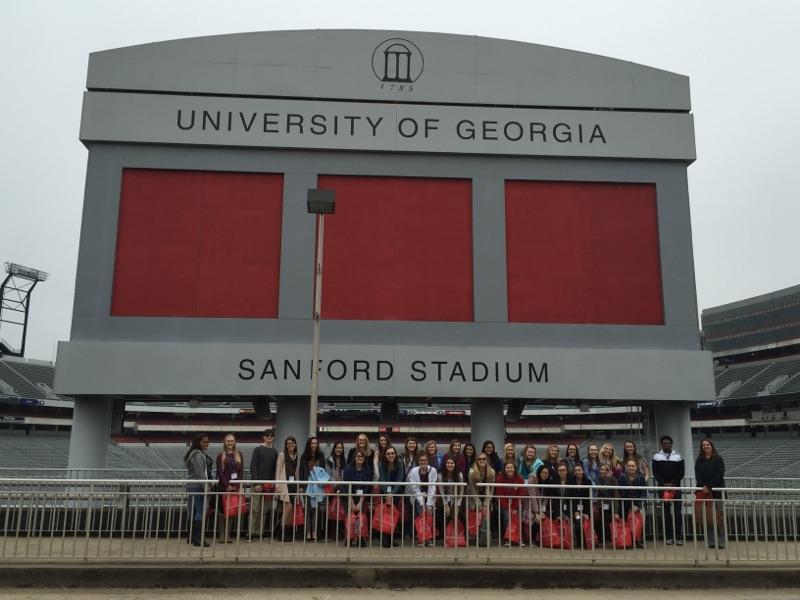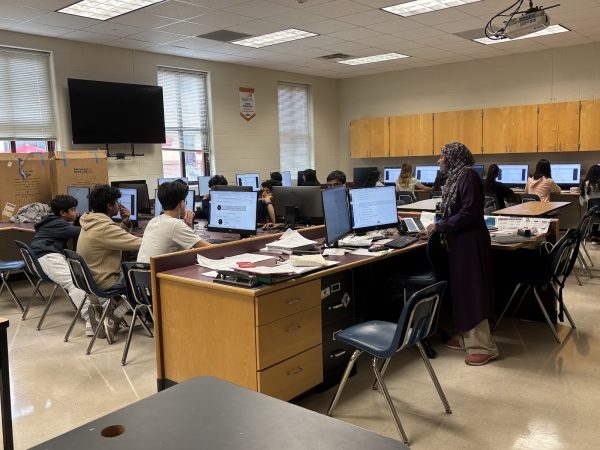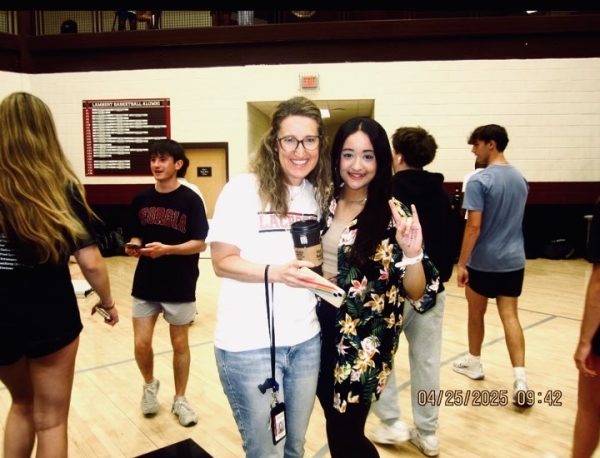Georgia teacher shortage creates worry for future educators
used with permission by Theresa Adamczyk
The teaching students of Lambert attend a PAGE conference at the University of Georgia to learn more about the field and current issues going on in the education world.
Some of us are lucky enough to know what we want to do when we grow up by the time we get to high school. Pathway classes are beginning to pop up with a diverse selection for students to explore. It’s a chance for students to get a taste of a certain career without having the stress of going through a change in major, like planting little seeds and figuring out which ones will take root and grow into a passion. For me, I knew that I wanted to be a teacher during my sophomore year. It was kind of like this “ah-ha!” moment where the idea of being a teacher became all I ever wanted to do from that point on, besides read books and write short stories. Although, I can’t take all the credit for that connection; I had an amazing teacher that year and come to think of it, I have had plenty of teachers in my past education that have been stellar in getting me to think outside the box and teaching in ways that made even the most boring topic seem interesting.
Mrs. Adamczyk was the woman who actually scared me into my “ah-ha!” moment within the first fifteen minutes of fifth period my sophomore year. I had come in, excited for another nine months of geeking out over almost every book we would study that year, knowing full well that I would be the kid to stay up late with a flashlight under the covers reading just “one more” chapter. Our summer reading assignment had been Anthem by Ayn Rand, a story about a man living in a post apocalyptic world where society has taken a whole new starting point on life by eliminating electricity, practicing socialism, and stripping everyone of any sort of identity. Walking into class, Mrs. Adamczyk had all of the desks lined up in rows with random combinations of numbers in the corners. She had instructed us to find our number and didn’t give any other instruction. When the class had figured out where they were sitting, she called out roll with our student ID numbers which took everyone forever to figure out. You’d be surprised to know how many students wouldn’t recognize their student ID’s out loud. Using her authoritarian voice, she stated that everyone in the class would get the same grade. She would never call us by our first names. She would only identify us by our student numbers. Most of us probably had a look of absolute terror on our faces as she kept up this image of dictator of the classroom. After about fifteen minutes she smiled and looked around, asking us how we were feeling in that moment. One kid was brave enough to say that he felt like part of a machine, nothing like an individual. Clapping her hands, Mrs. Adamczyk dropped the act and said, “Congratulations, you now know exactly how the Elders treated those people in the novel.”
That day I went home and told my mom that I wanted to become a teacher, and for over two years it has been a passion that has grown to epic proportions. Lambert has begun a teaching career pathway that has led me to some wonderful people and mentors. Having been in the program for so long, experiencing what it’s like to be in the classroom with students. Having a job in a local after school program I can’t picture spending my future career time any other way. Teaching is something that I want to latch onto until it’s time for me to collect my social security. Maybe that is just my naïve way of looking at the future like it will be all sunshine and daisies that keeps me going. Imagining my future students learning to love a piece of literature like I do, picturing my future classroom decorated with art from student projects or posters with quotes and Game of Thrones characters. My friends always make fun of me for using the phrase, “when I become a teacher…” before everything I say. So, when I heard about the report published in October last year mentioning a teacher shortage in Georgia, my first thoughts were how and why such a wonderful profession could be so quickly dragged through the mud? As someone who sees this as the rest of their lives, I demanded answers and explanations.
The report is everything I could picture being in a teacher’s nightmare. After analyzing it in my own teaching class, a lot of us were left wide eyed and confused about what our own futures hold for us. We all know that teaching is no easy task but we never figured conditions in schools were as bad as these teachers were claiming. They gave testimonies of feeling under-appreciated and being forced to take on tasks that are not related to being in the classroom. Others talked about their frustration with curriculum being too restrictive and not being able to teach freely, lesson plans being strangled by a heavy pile of standards to be met in order for students to pass a state made test. The scores from that will then determine if that teacher is doing their job, the students now holding fifty percent of the weight of a teacher evaluation with the Student Learning Objective (SLO) testing in Georgia. Not only were the testimonies shocking, the statistics taken from a poll for Georgia educators are equally as jaw dropping. Over forty percent of Georgia educators leave the profession within the first five years and the reason is not necessarily the dictated curriculum or the new teacher evaluation system; it’s the lack of support going into the job that leaves so many rookie educators scratching their heads as to what they missed in college.
Forsyth County is somewhere that I would like to come back and teach when I am finished with school; it’s an area that has a lot to offer academically and has a diverse range of extracurricular activities for students to get involved in. With the swarm of new teachers arriving in the county, and a handful of them coming to Lambert, I wanted to see what kind of support system Lambert offers to new teachers. Kim Clapper, one of the mentor system coordinators here at LHS and an educator with over twenty years of experience, was able to sit and discuss the mentor policy for new teachers and her response to the report.
“Disappointment, concern, a little frustration,” admits the veteran educator. “But I understood where people were coming from with that and it’s just extremely disappointing to see that our profession has gotten to this point where people are getting so frustrated with it.”
In terms of the mentor process here, new teachers are assigned a mentor that fits their specific needs coming into the profession to make sure that they are getting the support that they need. That is something that experienced educators did not have the luxury of experiencing to such a personalized extent.
“We check in with them monthly, have meetings or go out for coffee or lunch. We maintain a very personal relationship with them. The current mentor system is a lot more in depth, there’s a lot more planning involved, there’s a lot more that the mentors do to help new teachers.”
Mrs. Clapper took a minute to go down memory lane and talk about the retired ways of introducing a new educator into the classroom. “It’s a lot different than when I started twenty years ago. My department chair was the person I reported to. She gave me a hard time, but it pushed me and made me work harder.”
Those in the teaching pathway, like myself, know that when the time comes around to go to the job fairs and get the interviews, we are putting everything we learn into use but will also be surprised as to how much those classes don’t prepare us for. It’s like high school math; we learn the Pythagorean theorem and how to multiply and divide complex and imaginary numbers but when the time comes for us to actually do something adult like balance a checkbook or apply for a loan, we have to scratch our heads and ask Google what exactly we need to do. Now, it’s understandable that classes are not meant to prepare us for every scenario known in the education universe, but it seems that budding teachers are being thrown head first into a profession that needs more than just a lesson book to be successful.
The teaching classes recently went to a workshop day down in Athens at the University of Georgia, a future educator day designed by PAGE to recognize those who have chosen or are thinking about education as a career. Blair Inabinet had come to speak, giving a presentation that told her “education life” story. A runner up to the 2016 Georgia Teacher of the Year and an educator of over ten years, she had definitely noticed shifts in how new teachers were being treated. She didn’t sugar coat anything for us. She just flat out said, “Teaching is hard. There will be days that you want to jump up and down with excitement and others where you will call your momma at home and cry out your questions of ‘why did I choose this?”
It was a slap of reality, this presentation. Knowing now that there are all of these issues coming up in the profession and so many people are leaving, it’s stressful to think about what it is I am to expect coming out of college and getting my first classroom. The crisis itself is something that can be extremely discouraging and the guest speaker admitted that. She talked about her own mentoring experience and how she made sure to ask questions and make close relationships with higher level people and get out of her comfort zone. Even with all of this, what feels like, collapse going on in the profession in Georgia, she told us, “Teach anyway, because at the end of the day it is absolutely worth it.”
My naïve way of thinking about this profession has definitely gotten a kick to the curb. It won’t always be sunshine and daises with this job and it does take a particular kind of person to take it on everyday. Even with all this commotion going on in the pathway right now that might be turning people away, I feel even more driven to work that much harder to make sure that this next wave of educators can help change the future of education. The weight of state and county restrictions for standards and rules can be overwhelming and exhausting. The under-appreciated feeling will probably linger. We will have days where we ask ourselves why we didn’t pick a desk job at some corporation. We’ll have those days with our students where they are right on point with everything and it’s clicking with them and others where they look like a deer in headlights after we’ve tried explaining it three other different ways. Even after all of that, at the end of the day when we ponder, we must keep reminding ourselves to “teach anyway”.
Your donation will help support The Lambert Post, Lambert High Schools student-run newspaper! Your contribution will allow us to purchase equipment and cover website hosting costs.









Joseph mitchell • Mar 7, 2016 at 9:45 pm
Jessica, what a great article and a very good read. I see why you are the editor. Keep up the good work and you will make the difference that is sorely needed. You will carry an important weight in the next few years. I pray for daily energy, perseverance, happiness, even joy for you! You are coming to the teaching field at a good time to help set straight some jaundiced ideas that have made their way into the business of teaching. You already have a good idea of the kind of things teachers are required to spend time on that are only marginally worthwhile. You may also want to run for elective office so as to be in a better position to take away some and leave only the most relevant reports to be required of teachers. I pray for you. The task will not be easy. You could have chosen a different path, but you are so well qualified for this difficult job you will rise above the difficulties, and the victories you will see will be important to you but will also be important to education in general.
Nothing has changed. I have always felt you were blessed with talent. Actually something has changed: I believe in the importance of your path even more. Keep up your good work, Much love from Granddaddy Joe